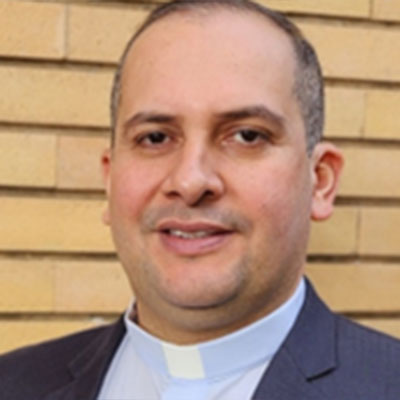 by Márcio Flávio Martins, cicm
by Márcio Flávio Martins, cicm
General Councilor
“The Spirit of the Lord is on me because he has anointed me to proclaim good news to the poor. He has sent me to proclaim freedom for the prisoners and recovery of sight for the blind, to set the oppressed free.” (Luke 4:18)
The XVIth CICM General Chapter, like the previous General Chapter, considers Justice, Peace, and Integrity of Creation (JPIC) as one essential element of our missionary activity. In the spirit of the last General Chapter, I wish to develop my reflection on JPIC in a Changing World. In sum, I aim to discuss four points: JPIC begins at home, JPIC in the Bible, JPIC in the Social Teaching of the Church, and lastly, the importance of JPIC to Proclaiming the Gospel in a Changing World.
JPIC begins at home.
We often come across questions that are both intriguing and unsettling. For instance, how can we talk about justice and peace in other parts of the world when we are not developing respectful and peaceful relationships within our communities? Similarly, how can we express concern about the pollution of the oceans when we fail to segregate and dispose of waste and trash properly in our neighborhoods? How can we claim to care about the hole in the ozone layer when we do not practice the 3Rs (reduce, reuse, and recycle) in our communities? How can we participate in rallies for various causes if we do not treat our employees and collaborators justly and fairly? How can we serve migrants in ministry if we are not willing to live with confreres of other nationalities? Finally, how can we talk about justice if our attitudes are influenced by clericalism, abuse of power, and abusive relationships? We need to "walk the talk" to impact the world positively.
As I reflect and write, I am reminded of some great confreres who dedicated themselves to the JPIC ministry: Raymond Bodson, a Belgian Missionary in the Philippines; Jan Hanssens, a Belgian Missionary in Haiti; and Daniel Orpilla, a Filipino Missionary in Brazil. These confreres have inspired me with their passion and commitment towards JPIC. Many other confreres have served and still serve in the ministry of JPIC, and it is impossible to mention them all here. However, by observing their JPIC ministry, I realized how particular and unique this ministry is, and only some have the heart and skills to embrace it fully and passionately. Nevertheless, JPIC is meant for everyone, as its foundation is in the Bible and the Church's Social Doctrine. Therefore, anyone can develop the necessary skills to promote JPIC, even through simple initiatives.
As a community, we should prioritize practicing JPIC. We must begin by living it out in our daily lives. This can be achieved by performing small acts of kindness and nurturing relationships based on mutual respect. Our next step should be to participate in networks with different Church Organizations, NGOs, and individuals who are directly or indirectly involved in JPIC concerns.
JPIC in the Bible
The Old Testament puts us before the God of Creation. We are before a God who creates and cares for his creation. He expects us to develop a respectful relationship with the environment and one another. (Ex. 23:10-11, Lev. 25: 1-7, Lev 25: 7, Ex. 23: 4-5). In the Old Testament, we find the Prophets. They were brave people called and sent to proclaim the truth in God’s name. They were unafraid to join the oppressed in their plight for social justice against economic, political, and religious oppressors. Kings, religious leaders, and landowners did not intimidate the Prophets, who denounced all that was oppressing people. They also took the side of these people by encouraging them to stand for their rights and hope for a better and just society. (Is 1:10-17, Jer 7:1-7, Amos 5:11-15; 21-24, Mic 6:1-8).
Throughout the New Testament, Jesus repeatedly demonstrated great compassion towards the oppressed, the abandoned, the persecuted, the poor, the foreigners, and minorities. For instance, on a Sabbath day, Jesus allowed His disciples to eat, showing that saving life is more important than following the law. Jesus also had a unique relationship with people transcending cultural, religious, gender, and social boundaries. His encounters with the Samaritans serve as a clear example of His unconditional love towards everyone. (Mark 2:23, Luke 4:18-19, Matthew 5:1-11, Matthew 6:3).
Jesus' proclamation of the Kingdom of God is worth mentioning, particularly during times of great poverty and suffering. As the Messiah, he brought hope to people by proclaiming the Kingdom of God. Although his proclamation was full of eschatological content, he also spoke of a new social-economic-political reality where people could experience life in abundance. Jesus promised the fullness of life both here on earth and in eternity as he represented the "already" and the "not yet" of Salvation. In John 10:10, Jesus said, "I came that they may have and enjoy life, and have it in abundance," while in Matthew 25:46, he said, "and these shall go away into everlasting punishment: but the righteous into life eternal."
JPIC and the Social Teaching of the Church
During my theological studies, one of my teachers once said that the most unread Church documents are those related to the Social Teaching of the Church (STC). Although she had her reasons for saying this, I have observed that very few Catholics are interested in studying and practicing the Church's social teachings. By ignoring the STC, we miss the opportunity to be enriched and equipped with various documents that help us develop a prophetic and liberating missionary presence in the world. From Rerum Novarum (1891), the Encyclical of Pope Leo XIII on Capital and Labor, up to recent days, many Church documents have been published, each attempting to address concrete social realities faced by people around the world. The publication of these documents shows that the Universal Church is not indifferent to the abandoned and oppressed people worldwide. One of the most quoted documents of the Church is the Vatican II Gaudium et Spes, which says: "The joys and the hopes, the griefs and the anxieties of the men of this age, especially those who are poor or in any way afflicted, these are the joys and hopes, the griefs and anxieties of the followers of Christ." (GS 1).
Over the past few years, Pope Francis has brought about significant changes in the Catholic Church, steering it towards a more prophetic and liberating presence in the world. His documents, namely Evangelii Gaudium (2013), Laudato Si (2015), and Fratelli Tutti (2020), are the three most important documents that highlight his concerns for justice, peace, and the integrity of creation. However, the impact of Pope Francis goes beyond his writings; his actions and preaching have had a profound effect on the Church and the world. His concern for the marginalized and the environment has made Justice, Peace, and the Integrity of Creation (JPIC) central to the Church's mission. Pope Francis has reinvigorated the Church's preferential option for the poor, and his desire for a renewed missionary Church is evident. For example, in Evangelii Gaudium, the word "poor" is mentioned 91 times, "peace" 58 times, and "justice" 37 times.
Pope Francis’s teachings often are about justice, peace, love for one another, and care for creation. He invites humanity to convert, change lifestyle, be aware of consumerism, and combat global warming (LS 23). The Pope calls us to an ecological conversion and to improve our relationship with creation by becoming faithful stewards of God’s handiwork (LS 217); above all, the Pope calls us to be aware of the grave social sin in which the poor are the primary victims (LS 30).
JPIC is a way to Proclaim the Gospel in a Changing World.
The XVIth General Chapter had the theme of "Witnessing to the Gospel in a Changing World". The Congregation of the Immaculate Heart of Mary (CICM) has been spreading the Gospel across the globe for over 160 years. We have been present in various contexts and times throughout human history. We have survived the Boxer's Revolution in China, several pandemics, and two world wars. However, we have not only survived but also persevered in proclaiming the Gospel during times of deep crisis. CICM has always been attentive to the signs of the time and has responded to the challenges posed to the Institute with a prophetic spirit.
The mission of spreading the Gospel continues in different times and contexts. It is our duty to proclaim the Gospel efficiently and coherently without hesitation or fear. We are called upon to engage in various social realities that require our missionary, prophetic, and liberating presence. In this regard, we face several social challenges in this changing world where CICM has a prophetic role to play. These challenges include:
- Caring for people living in poverty in urban, rural, and indigenous areas.
- Caring for abandoned elderly and children.
- Caring for the environment by promoting reforestation where necessary.
- Caring for and upholding the dignity of women who have been battered, persecuted, or abandoned.
- Caring for and promoting the dignity of homosexuals (LGBTQIA+).
- Caring for migrants.
- Caring for people suffering from depression and loneliness.
- Providing food, clothing, and love to homeless and abandoned individuals.
- Working towards reconciliation and dialogue among various ethnic groups.
- Educating children, youth, and adults, particularly those from impoverished backgrounds.
- Promoting ecological awareness, education, and waste segregation.
- Promoting eco-spirituality and harmony with creation.
- Promoting the Social Doctrine of the Church among the laity and within our community.
- Promoting various organizations that aim to combat corruption.
- Promoting the proper use of social media and combating fake news.
- Combating all forms of racism.
- Engaging in interreligious dialogue and ecumenism to promote peaceful and just coexistence of people from diverse faiths.
The possible social realities are endless. It's important to modify this list based on the social context that we find ourselves in. Regardless of the society, we will encounter individuals who are struggling for various reasons. We cannot ignore these issues and pretend that everything is okay. The book of Revelation urges us to act: "I know your deeds, that you are neither cold nor hot. I wish you were either one or the other! So, because you are lukewarm, neither hot nor cold, I am about to spit you out of my mouth." (Rev 3:15-16).
Concluding notes
The JPIC ministry has the potential to significantly impact the lives of those who embrace it. It can become a way of living and carrying out a mission. The JPIC ministry is not limited to progressives or leftists. It is a ministry that is firmly grounded in the Bible and the teachings of the Church. For these and other reasons, the last General Chapter has once again emphasized JPIC as one of its concerns. The Chapter urges those directly involved in JPIC to continue their ministry with enthusiasm and dedication. Supporting our fellow members who are actively engaged with JPIC concerns, such as JPIC coordinators, is an invitation to all of us, especially those in leadership roles. As for all other members, the Chapter hopes for greater openness and attentiveness to the various social realities present in our respective mission areas and, above all, that we actively engage with them. Overcoming all forms of complacency, indifference, and selfishness that prevent us from participating in the JPIC ministry remains a challenge for many among us.
To conclude, let us remember the words of Pope Francis on the occasion of the First World Day of the Poor, November 19, 2017. He said, "It is a scandal that there is still hunger and malnutrition in the world! It is not just a matter of reacting to immediate emergencies but facing together, at every level, a problem that challenges our personal and social consciousness to arrive at a just and lasting solution. Let no one be forced to leave their own land and cultural environment due to a lack of means of subsistence." §









